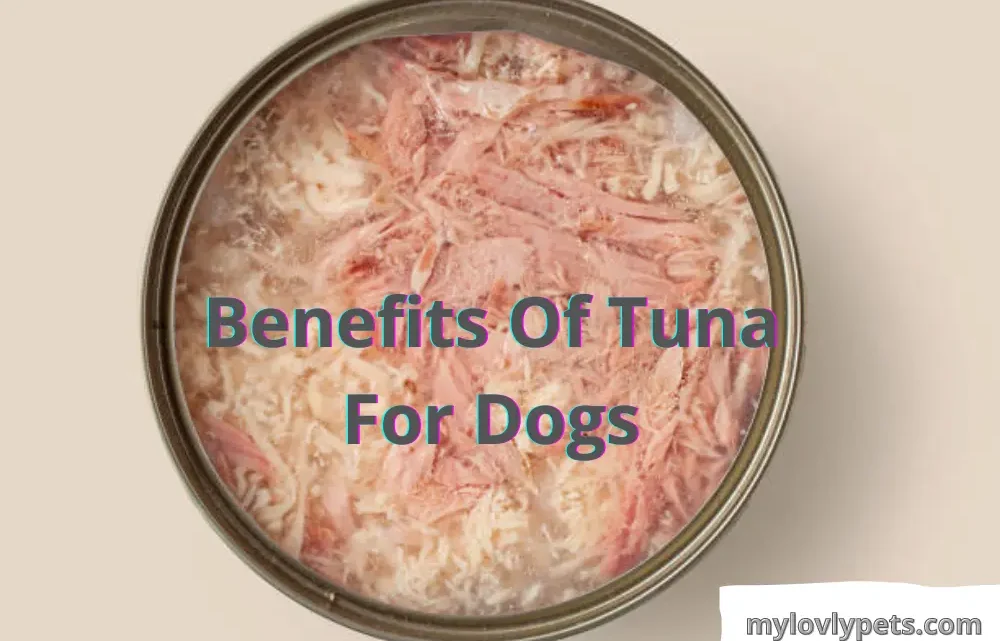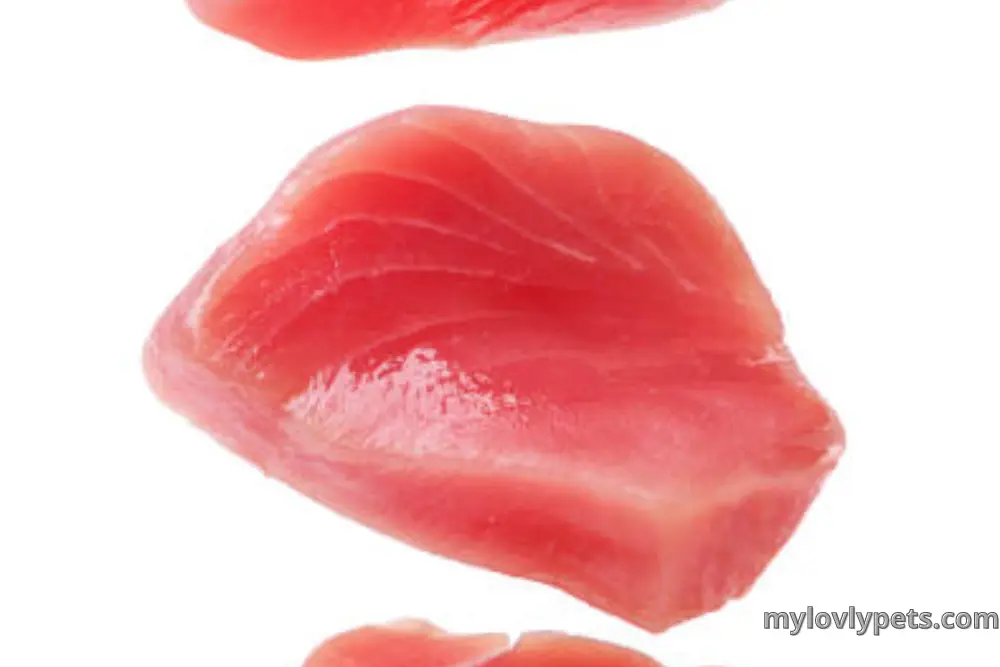
Is Tuna Fish Good For Dogs? Benefits Of Tuna For Dogs
Fresh fish is widely recognized as a critical component of a healthy diet, but many don’t eat enough of it. The easily absorbed protein, omega-3 fatty acids, and other nutrients found in fish are excellent for keeping our dogs healthy and happy.
As a bonus, dogs who consume fish oil have fewer skin allergy symptoms and a coat and eyes that look healthier and brighter. It’s essential to provide your dog with a balanced diet, including fish as a source of protein.
Can dogs eat tuna? Is tuna fish good for dogs? Find out here about the Benefits Of Tuna For Dogs and its drawbacks, recommended serving size, and other important considerations while feeding tuna to your dog.
Can a Dog Eat Tuna Fish?
The answer is yes if you’re wondering whether tuna is safe for dogs. There are many Benefits of Tuna for Dogs. If you do it right, this high-protein, omega-3-rich fish can be a healthy addition to your dog’s diet.
Tuna is nutrient-dense saltwater fish rich in protein, selenium, magnesium, and potassium. The best tuna for your dog is fresh, wild-caught tuna from a fisherman, a butcher, or the supermarket. While it is safe to feed dogs small amounts of canned tuna in water, olive oil, or brine, it is best to avoid giving dogs any raw fish.
Avoid eating canned tuna if it is in any kind of sauce, including tomato sauce or seasonings. Atropine, found in tomatoes, can lead to palpitations, dilated pupils, and shakiness. The healthiest option for both you and your dog is fresh tuna. Canned tuna is fine occasionally, but it shouldn’t be fed to dogs regularly because of the risk of contamination.
Benefits of Tuna for Dogs

Rich in protein: Tuna is high in protein, which gives dogs energy and helps them create strong muscles.
Rich in potassium and magnesium: Tuna is an excellent source of potassium and magnesium, two minerals beneficial to the health of muscles and other tissues.
Rich in Omega 3 fatty acids: Benefits to heart health, inflammation, and cholesterol levels can all be attained by eating tuna, which is rich in omega-3 fatty acids.
Omega 6 fatty acids: Tuna is an excellent source of omega-6 fatty acids that benefit your dog’s skin and fur.
Less Bad Fat: Tuna is lean and low in harmful fat. In other words, it won’t add unnecessary fat or calories to your dog’s diet, reducing the risk of obesity and related health problems. This helps dogs lose excess weight.
Vitamins B: B3, B6, and B12, all of which are found in tuna and are essential to maintaining a healthy metabolism and stable energy levels.
Phosphorus: is one of the essential building blocks of bone, and tuna is a good source of this mineral.
Possible Health Concerns of Tuna
As long as your dog doesn’t develop an allergy or bad reaction to tuna, giving it to them sometimes is probably safe.
Some types of tuna, especially albacore, are highly high in mercury, which might cause problems if fed to a dog in large quantities. When eaten in large amounts, this heavy metal can be poisonous.
It’s true that dogs, like humans, can tolerate some mercury, but their overall tolerance is probably far lower than ours, and they’ll hit their maximum much sooner.
As with any food, moderation is essential when feeding your dog tuna; the fish should be used as a treat only sometimes.
Signs of Mercury Poisoning in Dogs:
Hair Loss
Stress or anxiousness
Blindness
Damaged kidneys, which cause unable to urinate and abdominal swelling
Impairment of coordination
The paws lose their sensation.
Tremors
Blood vomiting
Diarrhea that is either watery or bloody
Take your dog to the vet immediately if you notice these signs.
Is Raw Tuna Good for Dogs?

Dogs can safely eat well-prepared fresh tuna. No sashimi for your dog; raw or undercooked tuna contains bacteria that can be hazardous to canine health.
Tuna Mercury: Safe for Dogs?
Canned tuna comes in two main varieties:
albacore tuna
skipjack tuna
All chunk white tuna in cans is albacore. Albacore tuna has almost three times as much mercury as skipjack tuna, which is used in most canned light tuna products. Albacore tuna contains mercury advisories from the FDA.
Tuna can contain varying amounts of mercury depending on its species and the fishing method used to catch it. If you want to know how much mercury is in the seafood you’re planning on eating, you can use the EDF’s Mercury Calculator.
Dogs can eat canned chunk light tuna, but not albacore because it has lower mercury levels. When choosing a canine diet, skip albacore and white tuna because they contain more mercury.
Is Canned Tuna Good for Dogs?

A lot of canned tuna is loaded with salt. Check the label to ensure the can’s tuna hasn’t been flavored with anything other than water. Dogs shouldn’t consume too much salt or other seasonings because it can harm their health.
You may remove some salt from canned tuna by soaking it in water overnight before cooking and offering it to your dog.
Tuna is canned in various liquids, including freshwater, brine, and sunflower oil. The best-canned tuna is the kind that is packed in water, not oil or brine.
How to Cook Tuna for Dogs
Dogs can eat tuna, both cooked and raw. You may make your dog a healthy meal by safely cooking some tuna by either steaming, baking, or grilling it.
Do not season with salt and take out all bones. Because of their small size, fishbones pose a serious choking risk to your dog if they are accidentally swallowed.
Can Dogs Drink Tuna Juice?
It’s fine to give your dog a small amount of the juice, but keep in mind that it’s loaded with sodium and unneeded.
Small amounts of tuna juice are safe for dogs, said the ASPCA. However, an animal’s digestive system may be overly sensitive to it. If you notice any signs of vomiting or Diarrhea, stop giving it to the dog immediately. Keep in mind that 95–90% of your pet’s daily calories must come from a balanced pet diet.
A tasty treat that may encourage them to drink more water is the addition of tuna juice to their drinks.
How Much Tuna Should I Feed My Dog?

Tuna is healthy in moderation but feeding it often will cause mercury buildup in your dog’s tissues.
Please don’t give your dog tuna daily; limit it to one spoonful. Feed your dog a modest quantity of tuna or any other new food and watch for any adverse reactions. Usually, symptoms of an allergy or other health problem will start to show up within the first day.
Never feed a large dog more than one can of tuna per week. Smaller dogs should consume even less, half a can per week. Don’t let your dog devour an entire can of tuna at once.
Don’t give your dog any more tuna for a few weeks if you accidentally gave it some. Most owners save tuna as a special treat, even though larger dogs can eat it.
Avoid regularly feeding your dog tuna to be on the safe side. Every few weeks, a tablespoon of tuna in their dinner shouldn’t harmful. Based on your pet’s size, weight, and medical condition, your vet can recommend an appropriate amount of tuna for your pet to eat.
Which Fish is Best for Dogs?
Some of the best fish for dogs to eat are:
Whitefish
Flounder
Tuna
Salmon
Herring
Catfish
Cod fish
Whiting
Fish That Dogs Shouldn’t Eat
There are specific species of fish that dogs can’t eat.
Sharks, swordfish, king mackerel, and tilefish, among others, are normally caught and used when they are much older and larger. As a result, they frequently carry parasites in their skin, muscles, and internal organs, and they also tend to have dangerously high mercury levels.
If you want to keep your dog healthy, you shouldn’t give it any fish that was raised in a farm setting. Fish raised in a farm setting may contain hazardous levels of antibiotics and dyes that can be transferred to the dog’s tissue.
Is Tuna Fish Good for Dogs with Diarrhea?
Your dog’s stomach may not agree with the addition of tuna, which could cause them trouble. Therefore, dogs who have Diarrhea or stomach discomfort should avoid tuna.
Can Pregnant Dogs and Puppies Eat Tuna?
Supplementing the diets of weaned puppies and pregnant dogs with the lean protein found in tuna can help them grow and develop healthily. Light tuna can be given in tiny quantities as a treat or as part of a healthy home-cooked diet.
Consider This Before Feeding Tuna to Your Dog
Consult your vet before giving your dog any human food, as some of these items have been known to induce allergic responses in dogs. This article is informative and not medical or dietary advice.
Final Thought on Benefits of Tuna for Dogs
Dogs should eat fresh tuna in moderation. Cooked or canned tuna can be given occasionally. It will not cause any mercury poisoning or other health problems for your dog. Simply check to see that the tuna you buy is boneless, skinless, and seasoning-free.
Parasites and bacteria in raw tuna could make your dog sick. A healthy dog that receives complete nourishment can save you a great deal of stress in the long term. Safely satisfying your dog’s cravings is a part of being a responsible dog owner.


